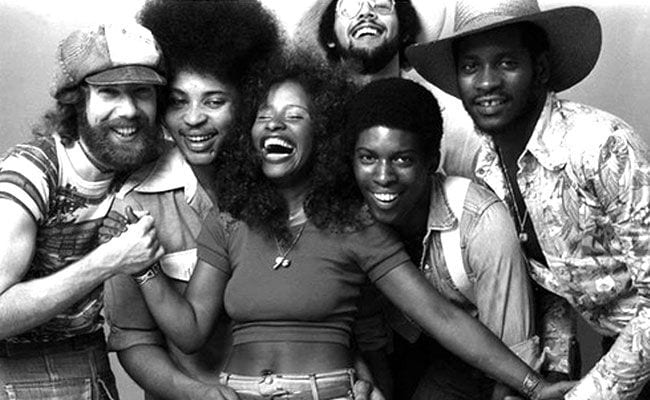
Younger readers should be made aware that Chaka Khan was at no time married to a man named Rufus. Instead, Ms. Khan joined a band called Rufus in 1973 (not to be confused with Estonian pop band Ruffus or the Australian indie group RÜFÜS – Rufus were in fact one of America’s most successful funk bands of the 1970s). Over the years this pairing has variably been known as Rufus & Chaka (again, potentially confusing), Rufus featuring Chaka Khan (less confusing) and Rufus with Chaka Khan (not confusing at all).
Stompin’ at the Savoy came about due to Khan’s increasingly successful solo career, and the decline of Rufus. Although bassist Bobby Watson states in the sleeve notes to this newly remastered re-release that Rufus was “Chaka’s band”, Rufus put out two albums without Kahn, Numbers and Seal in Red. Both of these struggled, and it seems a hard lesson was learnt. By 1982 the band admitted defeat, but Rufus and Kahn got together for three last live performances and this album of the shows (an accompanying documentary film was also made, shelved, then released on VHS).
The live recordings which make up the album are from February 1982, but there remains a distinct ‘70s feel, as if Starsky & Hutch are posing for photos with Huggy Bear at the back of the venue. “You Got The Love” (not the same song as recently made popular by Candi Station/Florence and the Machine, but the song written by Khan and Ray Parker, Jr.) was a number 11 hit on the Billboard chart, and is performed with horns and gospel-flavored backing vocals. It’s fun but kind of jivey (ominously, Rufus featuring Chaka Khan covered “Jive Talking” on their eponymous 1975 album). And jive seems prominent for much of the album: “Once You Get Started”, with additional vocals by Tony Maiden, is all about the groove, “Dance Wit Me” is similarly high-energy, but an uptight grammatologist’s worst nightmare (the use of “wit” is purposeful, not a typographical error, and the lyrics demonstrate the early adoption of “party” as a verb through the deep and meaningful lyric of “I love the way you party”).
Despite a “street” feel, much of the material sounds like adult-orientated rock – “Sweet Thing” seems too laid-back, as does the awkwardly spelled “Pack’d My Bags” until it unleashes into a strong funk workout. The ‘80s make their mark with a talk box in “Tell Me Something Good”, written for Chaka by Stevie Wonder, and the same effect makes an appearance in “I’m a Woman (I’m a Backbone)”. Khan’s vocal in the latter is impressive, but the track is spoiled by (what is now) dated synthesizer work. “You’re Welcome, Stop on By”, a duet with Maiden, also sounds a little out of its element now.
Things improve, and heat up, with “At Midnight (My Love Will Lift You Up)”, a sophisticated disco romp, and “Ain’t That Peculiar”, a fun and funky song made well known by Marvin Gaye. Lounge bar lizard meets soul in “Stay”, again showcasing the strength of Khan’s vocals and some excellent saxophone playing by Ernie Watts. “What Cha’ Gonna Do For Me” (first released as a solo Khan track) surprisingly comes across as cutesy as opposed to feisty, and “Do You Love What You Feel” ends the live section with a communal sing-a-long; fine if you were there, not so interesting if you weren’t.
Four studio recordings are tacked on to the album, as per the original release. The catchy “Ain’t Nobody” is the most well-known, having reached number one on the U.S. R&B chart and 22 on the Billboard Hot 100 chart. The remaining tracks are of a high standard but certainly of their time. “One Million Kisses” is a pleasant up-tempo ballad, “Try a Little Understanding” is an ‘80s bass-heavy funk track, and “Don’t Go to Strangers” attempts a smooth jazz standard with pleasing results. Strangely, these studio tracks are the highlight of what is pushed as a live album, and perhaps show after all that Rufus and Chaka Khan could have kept a good thing going. I feel for you, Rufus, but Chaka Khan had other plans.

